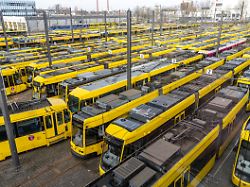“Burden on employees”
Verdi is calling for new strikes in local transport in North Rhine-Westphalia
March 1, 2024, 6:35 p.m
Listen to article
This audio version was artificially generated. More info | Send feedback
The strike actions in local transport will continue next week. Buses and trains in North Rhine-Westphalia should remain in their depots on Tuesday and Wednesday. In the meantime, collective bargaining agreements could be reached in other countries.
The Verdi union has called for new warning strikes on local public transport in North Rhine-Westphalia on Tuesday and Wednesday. After the strikes yesterday and today, Verdi wants to once again underline the demands in the current collective bargaining round. A central strike event is planned for Wednesday in Dortmund. “The dramatic labor shortage in public transport is putting an enormous strain on employees and high levels of sickness,” explained Verdi industry coordinator Peter Büddicker. It’s about “making local transport future-proof”. The union is ready to “find solutions together with the employers”.
Verdi is demanding, among other things, relief days for all public transport employees, identical places for starting and ending work, and allowances from the first day in the event of a temporary transfer of higher-value tasks. The collective bargaining negotiations in North Rhine-Westphalia are scheduled to continue in the third round on March 11th and 12th in Dortmund.
Meanwhile, at the end of the week, Verdi again paralyzed bus, subway and tram traffic in numerous federal states with a large-scale warning strike. It was the second round of warning strikes in the ongoing collective bargaining dispute in local public transport, which Verdi is carrying out at the same time in almost all federal states. The union was once again supported by the climate movement Fridays for Future, which also called for a nationwide climate protest. The two organizations appeared together at numerous demonstrations and rallies as part of the “We ride together” alliance to demonstrate for better working conditions in public transport.
According to Verdi, the warning strike affected more than 70 cities in almost all federal states. Only in Bavaria, Saarland and Thuringia were there no strikes. The warning strikes had already begun on Thursday in many countries. Restrictions are still expected in some countries tomorrow, Saturday.
“We are very satisfied,” said the Verdi specialist group leader for buses and trains, Andreas Schackert. “We were visible and successful with our strike; with a few exceptions, the industrial action went on undisturbed everywhere.” Schackert described the collaboration with FFF as a complete success. According to FFF activist Liv Manthey, thousands of people were drawn to the largest rally in Berlin’s Invalidenpark. Activist Luisa Neubauer and Verdi vice-president Christine Behle appeared there together.
Not deadlocked conversations everywhere
Verdi is currently negotiating new collective agreements with transport companies in 14 federal states. Higher fees are only involved in the federal states of Brandenburg, Saxony-Anhalt and Thuringia. The union also demanded more money in Saarland, but here both sides agreed on a deal a few days ago. In the other federal states, however, it is primarily about better working conditions for employees. In Hamburg, for example, Verdi intends to implement the 35-hour week. In Berlin, it’s all about longer turnaround times at the end of a route, more vacation days and vacation pay.
Meanwhile, the fronts in the negotiations have not hardened everywhere. There are likely to be deals in more and more federal states in the next few weeks. This means that the number of cities and districts in which Verdi can call for warning strikes is decreasing.
